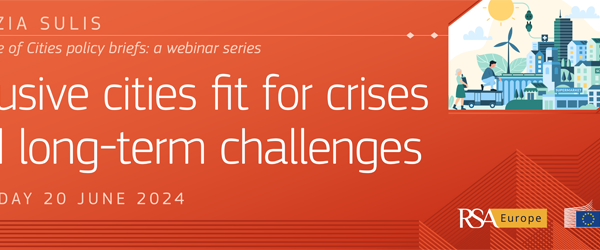JRC Future of Cities - Inclusive Cities Fit for Crises and Long-term challenges
Thursday 20 June

Alessia Calafiore, University of Edinburgh, United Kingdom
Alessia Calafiore is a Lecturer in Sustainability and Urban Data Science at the Edinburgh Futures Institute and the Edinburgh School of Architecture and Landscape Architecture of the University of Edinburgh. Alessia is co-lead of the CHASS Research Theme – Future Cities and co-organiser of EdinbR.
Alessia’s research sits at the intersection of Urban Planning, Geography and Computer Science and she is interested in developing new spatially informed computational methods to better understand the mutual relationship between human behaviours and their urban contexts. This work blends traditional and new forms of data to provide quantifiable evidence of urban dynamics and inform policy making. Her current substantive focus concerns how we can equitability manage Net Zero transitions within cities.
Daniel Hogendoorn, City of Amsterdam, The Netherlands
Daniël Hogendoorn is a senior strategic advisor on urban ecological transitions (climate mitigation, adaptation, biodiversity, circular economy), focused on long-term strategies to transform the Amsterdam urban system within planetary boundaries.
Juliana Gonçalves, TU Delft, The Netherlands
Juliana Gonçalves is an Assistant Professor in the section of Spatial Planning and Strategy, Department of Urbanism, TU Delft. She is also the co-director of the Centre for Urban Science (CUSP), a member of the Centre for the Just City, and contributes to the TU Delft Climate Action Program and the Delta Urbanism Interdisciplinary Research Program. Juliana has an interdisciplinary background and works at the intersection of social sciences and urban planning, design & engineering, often combining quantitative and qualitative research methods. Through the lenses of spatial justice, she draws from feminist and decolonial scholarship to understand socio-spatial dynamics in cities, with a focus on energy transition and climate adaptation. She is interested in how citizens and stakeholders engage with or react to urban transitions and how urban transitions impact people and communities, interacting with and often reinforcing existing inequalities.
Patrizia Sulis, Joint Research Centre, European Commission
Patrizia Sulis is a Spatial Data Scientist, specialised in Urban Analytics and Machine Learning. In her research work, she applies Data Science techniques to traditional fields of urbanism research, including urban diversity and vitality, urban morphology, spatial inequalities. She holds a PhD in Spatial Data Analysis from University College London and an MSc in Urbanism from the Delft University of Technology. She is currently a Scientific Officer at the Joint Research Centre of the European Commission, where she carries research using Big Data and Machine Learning, investigating spatial patterns of inequalities in cities and territories related to access to service, digital accessibility, human mobility.
Trivik Verma, TU Delft, The Netherlands
Trivik Verma, Associate Professor at TU Delft and moving to University of Bristol. My research focusses on tackling challenges of urbanisation in an equitable and just manner. I am particularly interested in understanding the processes that drive and shape urbanization and reproduce inequalities. I focus on using methods in spatial data science, complex network analyses and participatory mapping to develop computational and mixed methods for advancing the theories and practices of urban science. I also instruct on remote expeditions for National Geographic and Smithsonian where high school students have the opportunity to learn about conservation, anthropology, engineering and policy. Previously, I helped build a media and technology startup dedicated to the cause of making this planet a healthier place through authentic journalism and data science at The Outdoor Journal.
Click here to return to the JRC Future of Cities Event Page
